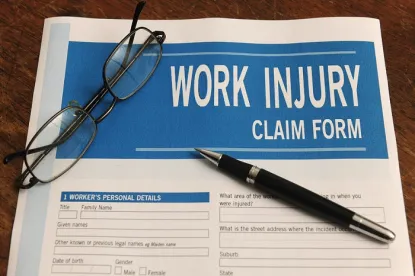Certain types of personal injuries are often adjudicated, at least in part, in front of quasi-governmental boards. For example, where an employer self-insures for workers’ compensation, claims by employees will be adjudicated before the workers’ compensation board governing that employer if they are not paid as demanded.
Nearly every employer that self-insures for workers’ compensation purchases excess insurance to protect against larger or catastrophic claims. In fact, many states require self-insured companies to purchase excess workers’ compensation insurance as a condition of approving the self-insurance program.
So what happens when a workers’ compensation claim against a self-insured employer is contested and resolved by the workers’ compensation board and in doing so the board makes a finding concerning the date of injury? Does that workers’ compensation board finding bind the excess insurer when the policyholder seeks coverage for that workers’ compensation claim under the excess policy?
In San Francisco BART Dist. v. General Reinsurance Corp., a self-insured public entity disputed a workers’ compensation claim by an employee. No. 14-cv-01866-JSC, 2015 U.S. Dist. Lexis 82242 (N.D. Calif. Jun. 24, 2015). The claim, which the employer originally denied, was resolved before the workers’ compensation appeals board. Part of the dispute involved the date of injury (the employee contracted a form of cancer). The parties settled and the board, in approving the settlement stated that there was new medical information that allowed the parties to stipulate to a date of injury for cumulative trauma that just happened to fall within the excess policy period.
The case has lots of facts and details that may be interesting from a workers’ compensation view, but the interesting issue to me is whether the excess insurer is bound by the workers’ compensation board’s order approving the settlement based on the date of injury it found acceptable. That question became relevant because after paying some of the claim, the excess insurer advised that it had no liability and demanded reimbursement of what had been paid out to date. A breach of contract action was commenced and the parties agreed to try the case in two phases. The first phase was on the date of injury: could the excess insurer litigate the date of injury?
In ruling for the excess insurer, the court held that it had jurisdiction to make a finding on the date of injury in a breach of contract action, even though an inconsistency could occur. The bottom line is that the policyholder was, according to the court, unable to establish that any legal doctrine barred the excess insurer from litigating the date of injury in a breach of contract suit. Key points include that the excess insurer did not seek to participate in the workers’ compensation appeal and that it was not brought into the workers’ compensation case by the policyholder. Nothing, therefore, precluded it in a breach of contact action from challenging the date of injury.
The court rightly stated that this is not an optimal result, but nothing the court does in the breach of contract case will affect the employee’s benefits as determined by the workers’ compensation board. Because the excess insurer was not a party to the workers’ compensation claim it is not bound by the workers’ compensation board’s finding of date of injury.
This is certainly a scenario that can repeat in other workers’ compensation situations as well as disability benefits and other compensation schemes that are derived from or approved by boards or agencies. But as the court indicated, if the excess insurer had been brought into the workers’ compensation case (or joined of its own volition), it might have been prohibited by issue preclusion principles from litigating in a subsequent coverage dispute issues decided in the workers’ compensation case.




 />i
/>i


